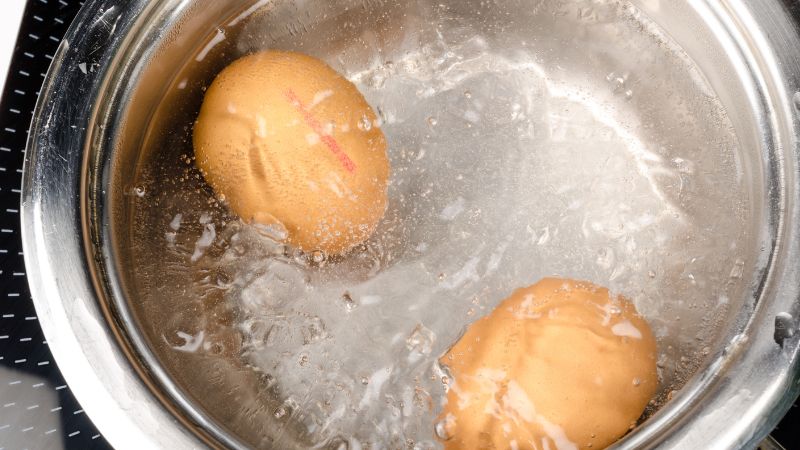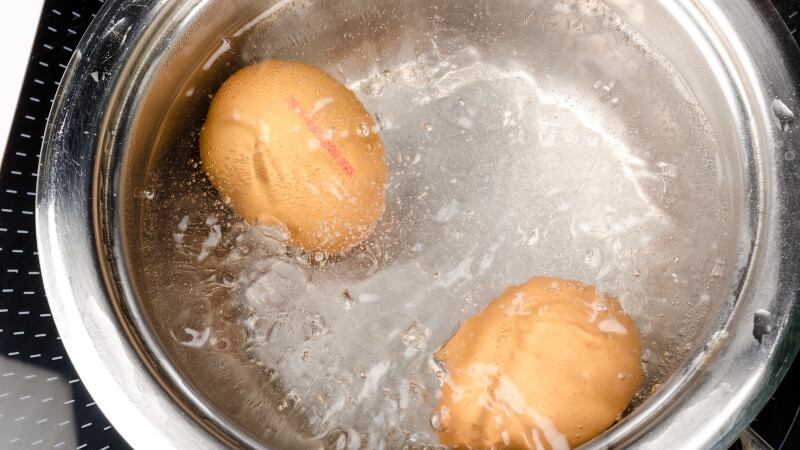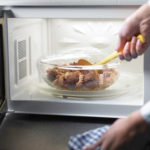Eggs can be prepared in various ways, but not all methods are safe and healthy. Making mistakes when cooking eggs can lead to food poisoning. In order to prevent this, it is essential to avoid the following errors:
1 Boiling too fresh eggs
Eggs that are too fresh are difficult to peel when boiled. It is recommended to boil eggs that have been stored for 1-2 weeks, as they have reduced moisture and an increased pH on the shell. This makes them easier to peel after boiling.
 Boiling eggs too fresh
Boiling eggs too fresh
2 Boiling eggs with hot water
Boiling eggs with hot water from the beginning can cause the eggshell to crack while the egg is not fully cooked. It is advisable to boil eggs with cold water, allowing them to gradually cook as the water temperature rises. Adding a little vinegar to the pot can also help prevent the eggshell from cracking.
 Boiling eggs with hot water
Boiling eggs with hot water
3 Using an inappropriate pot size
Using a pot that is too small for boiling a large number of eggs can result in uneven cooking and cracked eggshells. It is important to select a pot size that matches the number of eggs being boiled. For example, a 16 cm pot is suitable for boiling 4-6 eggs, a 20 cm pot for boiling 7-10 eggs, and a 24 cm pot for boiling 11-15 eggs.
 Using inappropriate pot size
Using inappropriate pot size
4 Boiling eggs for too long
Overboiling eggs can result in tough egg whites, dark and lumpy egg yolks with a sulfur smell. It can also cause stomach pain, indigestion, bloating, and a loss of flavor. To achieve perfectly boiled eggs, place the eggs in a pot of cold water, bring it to a boil, then turn off the heat, cover tightly, and wait for 10 minutes before removing the eggs. If you prefer eggs that are more well-cooked, you can extend the waiting time by an additional 5 minutes.
 Boiling eggs too well
Boiling eggs too well
5 Not soaking the eggs in cold water after boiling
If boiled eggs are left in the pot after cooking until they are fully cooked, they can become overcooked and lose their flavor. It is recommended to transfer the boiled eggs to a bowl and cool them quickly by adding cold water.
 Not soaking eggs in cold water immediately after boiling
Not soaking eggs in cold water immediately after boiling
6 Boiling eggs overnight
According to the US Centers for Disease Control and Prevention (CDC), eggs that have been left overnight are a common cause of food poisoning. Leaving eggs overnight can result in the production of harmful bacteria such as E.coli and Salmonella, which can cause digestive problems such as nausea and diarrhea. It is best to consume boiled eggs immediately after cooking and avoid leaving them overnight.
 Boiling eggs overnight
Boiling eggs overnight
7 Boiling eggs with tea water
Combining eggs and tea is not recommended, as it can have negative effects on digestion. Tea contains tannic acid, and eggs contain protein. The combination of these substances can slow down bowel activity and lead to indigestion, fatigue, and even poisoning. It is advisable to avoid boiling or consuming eggs with tea.
 Boiling eggs with tea water
Boiling eggs with tea water
8 Boiling eggs for too long
Boiling eggs for longer than the recommended time (15-20 minutes) can cause the proteins and sulfur in the eggs to combine, resulting in a loss of nutrients and negative effects on health. Overboiled eggs may also have cracked shells and an unpleasant taste. The best method is to place eggs in a pot of cold water, bring it to a boil, then remove from heat, cover, and let them sit for 10-15 minutes for different levels of doneness.
 Boiling eggs in the pot for too long
Boiling eggs in the pot for too long
9 Adding water while boiling eggs
Adding water to the pot while boiling eggs can cause the eggs to crack and the shells to stick together. It also makes the shells harder to peel and increases the risk of bacteria entering the eggs. It is recommended to add just enough water to slightly cover the eggs, preserving their nutritional value.
 Adding water while boiling eggs
Adding water while boiling eggs
10 Not fully boiling eggs
It is a misconception that soft-boiled eggs are more delicious and healthier than fully cooked eggs. Soft-boiled eggs can increase the risk of bacterial infection, digestion problems, and poisoning. It is important to fully cook eggs before consumption. The recommended method is to boil eggs in water, then turn off the heat and let them sit for 10-15 minutes, depending on desired doneness.
 Not boiling eggs thoroughly
Not boiling eggs thoroughly
These are the common mistakes to avoid when boiling eggs. By following these guidelines, you can protect your health and the well-being of your loved ones!
Source: VTC News online newspaper



































